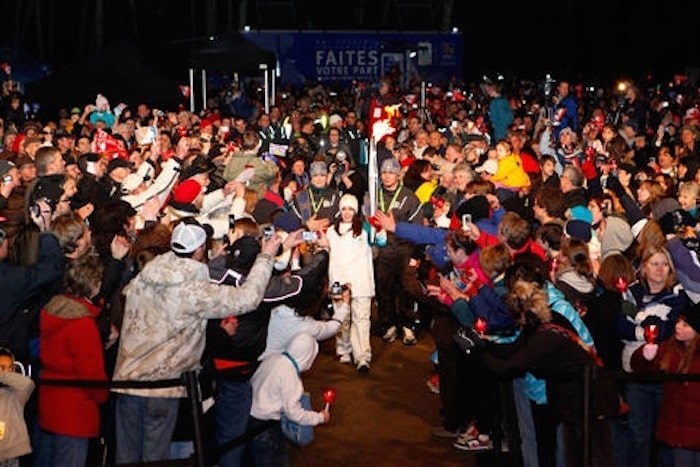The Canadian Olympic Committee and leaders of the Four Host First Nations said Friday that they need at least $1 billion from taxpayers to stage another Winter Olympics in B.C. in 2030.
The COC is acting as the bid committee with blessing and input from leaders of the Musqueam, Squamish, Tsleil-Waututh and Lil’wat councils. They estimate $299 million to $375 million would be needed in government grants to renovate existing venues left over from Vancouver 2010 and to build new ones, $165 million to $267 million for new Olympic Villages, and $560 million to $583 million to secure the Games.
Vancouver city council is expected to decide after hearing a July 20 staff presentation whether to support an official bid to the International Olympic Committee. The B.C. NDP government has provided no commitment so far and has given COC president Tricia Smith until Aug. 15 to provide a detailed plan, including whether all host communities and First Nations would each share costs and risks.
Salt Lake City, the 2002 host, and Sapporo, the 1972 host, are also exploring bids. The IOC plans to pick the 2030 location in May 2023.
The RCMP-led police and military operation at Vancouver 2010 cost almost $1 billion, which was substantially more than the original $125 million estimate. Mary Conibear, a former Vancouver 2010 operations manager who is also the COC’s provincial lobbyist, said a lower cost in 2030 would be achieved by relying on intelligence and technology, including surveillance cameras. She said the 2030 Games would be a sporting event with security, rather than a security event with sport — which was also the line often repeated more than 12 years ago by Bud Mercer, the RCMP officer in charge of the 10,000-person Vancouver 2010 Integrated Security Unit.
Conibear bristled at a reporter’s suggestion that relying on technology would affect Vancouverites’ civil liberties.
“Obviously, Vancouver is not Beijing,” Conibear said.
Conibear said the cost estimates were produced in tandem with RCMP and engineering consultants. Their names do not appear in the report and she did not provide their names when asked by a reporter.
“In every case, it's people with a great pedigree, but we can put that up on the website for sure,” Conibear said. By afternoon, the GamesEngagement.ca website showed bios for four security experts: senior RCMP event security veterans Alphonse MacNeil, Brian London and George Reid and Peter Johnston, formerly of the Royal Canadian Navy. No engineering or construction experts were listed with the bid feasibility team.
The Vancouver 2030 bid is positioned as “Indigenous-led,” but would any of the four host first nations be involved in financing the Games or assuming liability for a potential deficit?
Chris Lewis, the Squamish Nation director of Indigenous initiatives and reconciliation, was the only representative of the four to offer an answer. He indicated that the only commitment is in the form of land on which the Olympic Village would be built in Vancouver on land owned by First Nations-owned MST Developments.
“This is really about unlocking the economic potential of the host nations,” Lewis said. “As you know, we have 90 acres of land at Jericho that we had to purchase back as Indigenous peoples to start economic development, and now we're offering our own parcels of land for a little bit of time to build the athletes’ village.”
The report estimated an organizing committee’s $2.5 billion to $2.8 billion budget would be privately funded from broadcast, sponsorship, ticketing, merchandise and other revenue.
The report said the estimates include a built-in 25% contingency for increases and uncertainties, including cancellation insurance.
There is, however, a long list of unknown costs described as essential services that would be required from multiple levels of government for everything ranging from snow removal, traffic control, temporary road closures and waste management, bylaw enforcement and permitting, ambulance and health services to provincial emergency planning, border services, airports and visas.
The 2030 cost estimate also doesn’t include the possibility of government sponsorships and hospitality venues or related infrastructure. In 2010, the $2 billion Canada Line and $600 million Sea-to-Sky Highway were necessary for the staging of the Games. An extension to the Broadway Subway to UBC, with a station at the Jericho Lands, is proposed. If accelerated to meet a 2030 Games deadline, it would become a multibillion-dollar Olympic cost.
Most 2010 venues would reprise their roles if the Games return in 2030, except snowboarding and freestyle skiing would go to Sun Peaks near Kamloops, curling to the Agrodome, and big air skiing/snowboarding to a temporary ramp at Hastings Racecourse.
Whereas False Creek was the focal point for Vancouver 2010, the Vancouver 2030 hub would be Hastings Park. Nightly medal awards concerts would be held at the PNE Amphitheatre, and the official merchandise superstore, a daytime live site, cultural village and sponsor pavilions would be elsewhere on the site.
The only new venue with a publicly known cost is the amphitheatre, at almost $70 million.
The all-in cost to build and operate the Vancouver 2010 Games was as much as $8 billion, but the B.C. Auditor General never conducted a final report. The organizing committee, VANOC, was not covered by the freedom of information law and its records were transferred to the Vancouver Archives after the Games with restrictions not to open the board minutes and financial ledgers before fall 2025.




